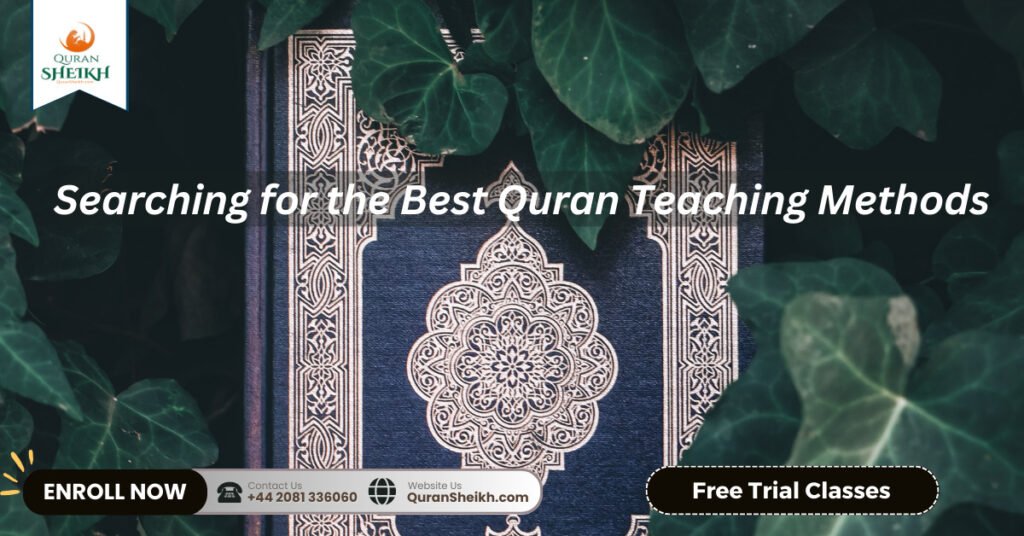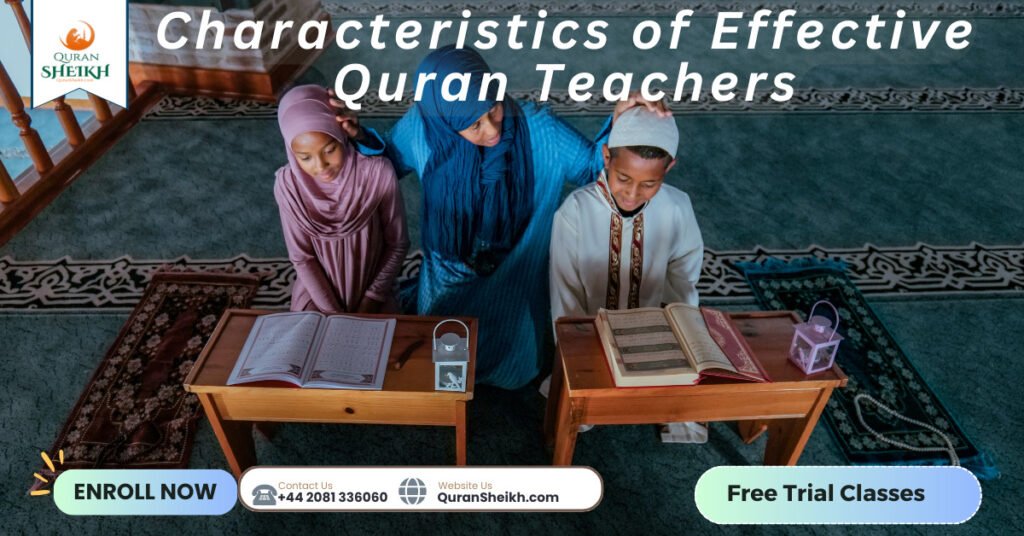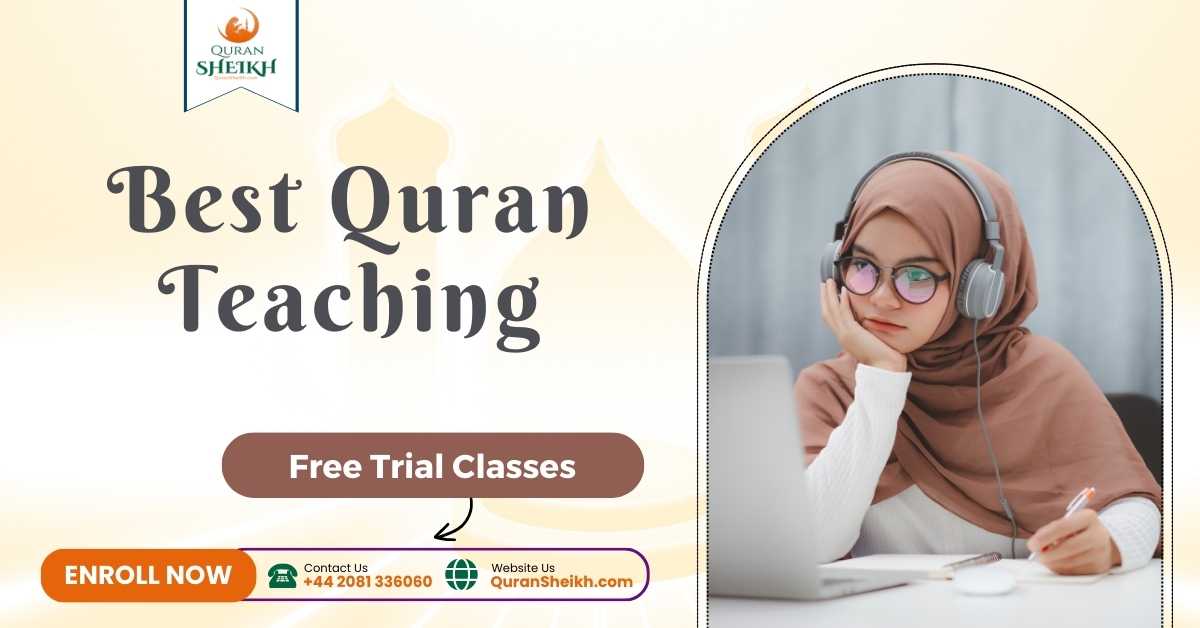Best Quran Teaching: Knowing the Quran is the most important component of Islamic education. The Quran is used by Muslims for basing their faith, whereby it lights the way through which one can acquire Islam’s true concept. There are several approaches to teaching the Quran, among them, being the traditional classrooms and modern online platforms.
This entails discovering the best ways of teaching people who are learning to read the Quran. This article explores extensively on the complexities of Quran teachings. It also includes characteristics of an effective teacher, the emphasis on memorization, using technology in education and online learning tools.
Join thousands of Muslim Families who love learning Quran, Arabic and Islamic Studies from the comfort of their Homes.
Introduction to Quran Teaching

This informative article provides vital information on the best way one should teach Quran, highlighting notable Quran teachers, the importance of memorization, technology in Islamic studies and internet-based Quran materials.
For a fulfilling life among the Muslims it is important to understand, follow and practice teachings that were found in the Quran. A phenomenon called ‘Quran teaching’ is used to learn and comprehend the guidelines contained in the Quran. In other words, this aspect of education was an integral part of Islamic education for ages.
This article will cover the values of Quranic lessons, efficient Quranic teaching methods and characteristics of competent Quranic teachers.
What is Quran Teaching?
Studying and understanding the teachings contained in the holy book known as Quran is termed as Quran teaching. It consists of learning Arabic, memorization of the ayahs (verses) of the Quran, and understanding the meaning and content of these verses.
The knowledge of Muhammed’s (PBHU) life and his understanding of Quranic concepts are among the lessons included in his teachings.
Importance of Quran Teaching
To be a good Muslim, one needs to learn to read the Quran which helps in leading righteous life. In this essay, we analyze some exceptional strategies in quality teaching and learning of the Quran. The teacher quality is discussed together with learning strategies, utilization of e-applications in teaching methods, etc. It also offers an overall assessment of existing internet sources.
Muslims acquire knowledge on their faith, the values it holds God’s messages through Quran teaching. The other benefit of Quran teaching is that it reinforces one’s belief and gives direction and meaning to life.
Quran Memorization Course Online with an Arab teacher with 30% Off
Searching for the Best Quran Teaching Methods

Traditional vs Modern Quran Teaching Methods
For centuries, Quran teaching has usually involved tutors such as the sheikh or an Imam. In this way, the student will sit down with teachers and repeat the Qur’an verse by verse. Feedback will be provided regarding pronunciation and the process of memorization.
Nonetheless, in modern days, technological innovation has allowed for distance learning of the Quran, using teachers from across the globe.
The teachings of the Quran also involve understanding the life of Muhammad (PBUH) as well as how he viewed the message in the Quran.
In traditional Quran teaching, learners have an opportunity for interaction with their teachers and immediate feedback. Learning about Quranic lessons also involves understanding what the prophet lived for and believed in.
On the other hand, online Quran teaching may provide flexibility and comforts, however, it has challenges for attention and motivation..
Characteristics of Effective Quran Teachers

Essential characteristic of efficient Quran teacher
A competent Quran teacher needs to be knowledgeable about the Quran and its lessons. They need very good communication skills as well as patience to teach at each individual’s pace as well as provide useful assessment. In addition, teachers need to be compassionate towards the fellow students and appreciate them as individuals with distinct ways of comprehending concepts.
Teaching Techniques for Quran Teachers
Good Quran teachers employ different learning methods which encompass pictures, stories, practical lessons, discussion groups, etc. Hence, they need to create a conducive studying atmosphere where students are interested in the Quran’s messages.
Technology and Quran Education
The Role of Technology in Quran Teaching
Through technology, it is easier to teach the Quran because online classes will enable the students to learn at home.
Students can be involved in a more interesting way by exploiting technological tools like the digital editions of the Quran, applications, video etc.
Challenges of Technology Adoption in Quran Teaching
Technology brings with it difficulties in teaching the Quran that include unreliable internet connections, lack of physical interaction between the student and tutor, and potential distractions during online classes. Therefore, educators should identify these challenges and find strategies to overcome them.
In actual fact, teaching of the Quran is significant to Islamic education as well. The achievement of such success requires that teachers be well versed with Quran lessons and employ appropriate teaching methodologies at the same time understand the merits and demerits of current technologies.
It is through the adoption of these steps that learners will have a better comprehension of Quranic laws and eventually live a better life by them.
Best Practices for Quran Teaching
The teaching of the Quran is one of the biggest tasks, and it should not be treated as an easy job. Discover the finest techniques to guarantee a productive and efficient learning occurrence using these tips:
Curriculum Development
It is very important to have a structured and detailed curriculum in order to teach about the Quran. Rote learning, correct pronunciation, understanding and actual use of learned material in daily life should be taken into account while creating curriculum. These are the problems that teachers should take note of and offer appropriate solutions to these constraints.
Classroom Management
A good Quran class should have a conducive environment where children are motivated with a sense of fun and they look forward to learning. By implementing classroom management strategies such as positive reinforcement, clear expectations, and individual attention, an ideal environment could be established. Also, rules regarding communication that requires respect for one another should also be established.
Evaluation and Feedback
Regular evaluation and feedback can allow monitoring progressions of students so that areas needing improvement are identified. Such measures would include tests, quizzes and oral discussion. Constructive feedback and encouraging words strengthen student’s motivation and focus on their goals.
Significance of Memorizing the Quran
Besides a religious duty, memorizing the Quran is an avenue whereby one obtains mental strength and peace. Here are some of them:
Benefits of Memorizing the Quran
- Strengthening of the memory
- Improvement in concentration and focus
- Spiritual connection and purification
- Islamic knowledge, ethics and morals
- Inner peace and tranquility
Effective Memorization Techniques
Character attributes such as dedication, patience, and endurance are required for one to be able to memorize the Quran. Some of these most useful measures include repetition, visualization and recitation with understanding for instance. Also, you must seek counsel from a professional teacher and keep practicing as well.
Resources for Learning Quran Online
The internet has made it so convenient to locate any of the Quran educational materials at any part of the globe. Here are some platforms and resources that can help:
Online Quran Teaching Platforms
For instance, some of the online Quran teaching websites are Quran Academy, Quran.com and Bayyinah TV. These platforms provide learning access for all individuals regardless of their stage or age, they may access diverse courses, live classes, and tutorials on demand.
Free and Paid Resources
One has access to various free and paid websites, videos, and android mobile apps that one may download at home where they can read a copy of the Quran. Among these, Quran Explorer, Quranic, and Understand Quran are some of them. Nevertheless, people need to do some homework to choose credible and reliable sites.
Conclusion and Final Thoughts on Quran Teaching
It is commendable and very rewarding to teach the Quran, as it entails immense patience and hard work. Through applying good practices, giving importance in remembering, and availing Internet resources, we may improve our learning of the Quran for all.
Summary of Key Points
– Some of the main best practices for Quran teaching include curriculum development, classroom management, and evaluation and feedback.
– There are spiritual and also mental benefits of memorizing the Quran.
– Repetition, visualization, and recitation with meaning are good memorization methods.
– There are online Quran teaching platforms, as well as free and paid resources, which can facilitate the accessibility and effectiveness of the Quran learning process.
Future of Quran Teaching
Learning the Quranic lessons also entails understanding what Prophet Muhammad (peace be upon him) believed so that they can understand his message and become acquainted with his lifestyle and religion.
On the other hand, it is necessary to keep the older effective ways and traditions. Thus, we should use old traditions together with modern technologies so that Quran teaching becomes more successful and promises us bright perspectives.
Through using the best practice of Quran teaching, teachers will establish an attractive and motivating educational setting that fosters learners’ needs. Learning can be much easier and meaningful when one has a Quran teacher. They will answer your questions and clear you of any doubts.
Technology will drive Quran learning into uncharted waters, redefining Islamic pedagogy and connecting it to learners across the globe.
Where can I get an excellent Quran tutor?
A productive learning experience can be ensured by identifying a good Quran teacher. Here are some tips:
- Ask for recommendations. Speak to your friends, relatives, and religious instructors about the best Quran teachers. They can also give you an idea on the teacher’s style of teaching, experience, qualification, etc.
- Look for certified teachers. There are several organizations that provide certification services to Quran teachers. The teacher’s attainment of a specified level of knowledge and teaching ability is certified by this certificate.
- Interview potential teachers. After that, contact one or two of these identified teachers and set up interviews with them. Doing this will enable you to know more about how they teach and hence learn about their teaching style, experience and qualification. Another important aspect is that you should inquire from them about themselves; i.e., are they available, how much do they charge, and what kind of payments they accept.
- Observe a teacher’s class. Where feasible visit or watch the class that has been taken by a teacher before being admitted in it. As they do this, it will also provide an opportunity for you to see whether their teaching style is right for you in person.
- You have to consider what you prefer or need. Therefore, while selecting a teacher, you should remember about yourself. For instance, you might wish to search for a teacher knowledgeable in one specific field of Quranic studies like reciting, memorizing or tafsir. Also, consider factors like gender, age, moods of the teacher.
Which is the best English translation of the Quran?
There is no one translation of the Quran that can be considered as universally perfect; each translation has its strengths and weaknesses. Some translations are literal while others make clear and easily comprehensible messages for the reader/listener. The final one among the variety you settle on is ultimately your favorite option as well.
These are some of the most popular English translations of the Quran include:
- Sahih International: This translation becomes popular as being both proper in language use and reading ease. A very popular translation for all over the world.
- Abdullah Yusuf Ali: This type of translation has a more literate manner and possesses large numbers of footnotes as an explanation. As such, it remains one of the alternatives suitable for those readers wishing to explore the essence of reading the Quran.
- Muhammad Marmaduke Pickthall: This translation has a reputation of being adaptable as regards to the veracity of the original Arabic text. Therefore, it suits those of us who enjoy listening to the Quran’s language.
One must remember that any translation of the Quran is an interpretation, and no translation could render a literal version of the original true Arabic text because all of them are nothing but interpretations of the real meaning of that true Arabic text itself cannot be translated. Therefore, one should seek clarification in many available versions and a few tafsir (translation) literature to arrive at a broader interpretation.
Here are some additional factors to consider when choosing a Quran translation:
- Target audience: Some of these translations will be for non-Arabic speakers while others will focus on Muslim readers, who had previously read the original Arabic text.
- Purpose: One may opt for readable or accessible translations particularly if it is the first time of reading the Quran. On the other hand, if you would like to go deeper into the Quran; perhaps the most accurate (literal) translation with footnotes for explaining hard words will be more convenient for you.
Personal preference: Lastly, the way of choosing an appropriate Quran’s translation is just trying many options until an attractive sounding option is found.
Why is translating Quran hard?
It should be noted that translating a Quran is not an easy job because of several factors:
To begin with, the Quran is authored in pure literary and poetical Arabic. This explains why a good number of these words and phrases hold varied meanings depending on their contexts. To translate accurately, translators must be well versed with Arabic and the culture in which Arabic is written in order to convey its true message to the target audience.
Secondly, the Quran is a religious document, and sometimes meaning is holy for Muslims. The translators have to ensure that no alterations be allowed on a Quran message that may cause it to be viewed in another light than it was originally intended for.
Thirdly, the Quran is a complicated and intricate composition. It addresses diverse issues such as theology, legal studies, morality, and history. In each of these categories, translators should faithfully represent the meaning of the Quran.
Lastly, the Quran is a beautiful and poetic text. In order to transfer the beauty and the rhythm of the Quran into their target language, translators should be good enough.
However, there are still many good translations which may be found in different languages despite these difficulties. For Muslims trying to understand their own religion and for those non-Muslims who seek an insight into Islam, such translations might be of great use
Best Quran memorization program with qualified Arab tutors and get 30% OFF, Quran classes for Kids
Frequently Asked Questions
What are the benefits of memorizing the Quran?
Muslims are greatly advantaged when memorizing the Quran. In addition, this can increase their ability to concentrate, pay attention and remember. It would also help them to believe in Islam better as an extra factor for strengthening their Islamic education. Secondly, it may give a person a sense of accomplishment, because they have committed Allah’s words to memory.
What are the best websites offering online access and tutorials for Quran learning?
There are different options for learning Quran online like websites, mobile applications, and online Quran platforms.
For example, they include quran.com, quranexploer.com, bayyinah.tv and qibla.com. This process of learning can take some time and it’s important to make sure that you visit a reliable and credible online portal while taking this Quran course.
Can I learn the Quran without a tutor?
One does not have to go through a Quran teacher; however, it is helpful to have one since it simplifies the process of learning. A teacher can be an effective facilitator who leads students to their learning paths rapidly through guiding, supporting, and providing feedback.
What are some of the best Quran teaching methods?
Examples include storytelling, group discussions, visual aids, and interactive learning. Such practices enable the learners to touch the Quran and be able to memorize it properly. Likewise, the creation of a collaborative environment is necessary.


